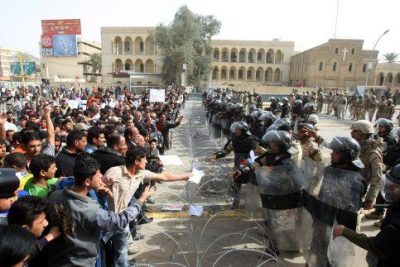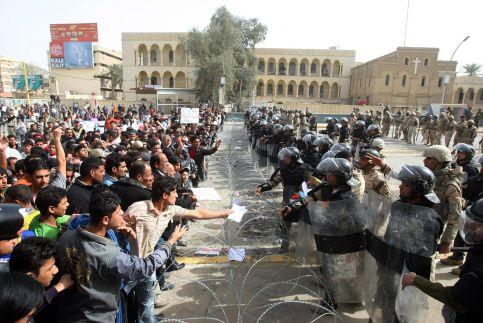 Millions of Iraqis made national history last month when they voted in provincial elections secured entirely by the Iraqi army and police. For a country that was in the depths of a vicious sectarian civil war only six years ago, merely defending a nationwide vote is a big accomplishment.
Millions of Iraqis made national history last month when they voted in provincial elections secured entirely by the Iraqi army and police. For a country that was in the depths of a vicious sectarian civil war only six years ago, merely defending a nationwide vote is a big accomplishment.
But to say that Iraq is turning a page from its dysfunctional past—a past riddled with violence between Sunnis and Shia—would be entirely premature. Terrorism remains a tremendous problem in Iraq today, despite billions of dollars in U.S. and international investment and the growth of Iraqi security forces. Before the provincial elections, al Qaeda in Iraq was rejuvenated enough to send a dire warning to the Iraqi government last December about an impending terrorist offensive.
Spurred on by the deaths of hundreds of Iraqi civilians each month this year, and by persistent complains about the government’s poor performance and rising authoritarianism, demonstrators are now taking matters into their own hands.
Multiple protests have popped up against Prime Minister Nouri al-Maliki, with most of them occurring in Sunni-populated provinces such as Anbar, Salahuddin, and Nineveh. Indeed, with ever louder chants of effective governance from certain sectors of the country, what Iraq may be going through is its own version of the Arab Spring movement—smaller and less universal, but equally empowering to those who are in the middle of it.
To Shia, the government of Prime Minister Nouri al-Maliki is simply dysfunctional, corrupt, and underperforming. But to Sunnis, that same government is oppressive, authoritarian, and actively working to exclude them from the political process.
Residents of Anbar Province, the vast stretch of desert in western Iraq where the bulk of the country’s Sunni population resides, have been vocally protesting against Maliki since the beginning of the year, over issues ranging from the treatment of Sunni detainees in Iraqi jails to an anti-terrorism law that seems to arrest more Sunnis than Shias. The Iraqi government’s decision to postpone the provincial elections in Anbar for security reasons only drove those protests to new heights, convincing many that the move was an attempt by Maliki to shut down a looming electoral defeat in the province.
In a country like Iraq—the victim of nearly 10 years of sectarian violence and al Qaeda-linked terrorist attacks—peaceful demonstrations can quickly degenerate into violence, which challenges the very strength and legitimacy of the government. The Iraqi army’s forceful entry into a protest camp in northern Iraq on April 23, which sparked clashes with Sunni gunmen in the area and resulted in the deaths of nearly 40 people, is a perfect microcosm of the vindictive view that the Maliki administration has taken with the protest movement—one that refuses to die.
Were it not for the deaths of so many people, the army’s shutting down of the protest camp in al-Hawija may not have elicited such a strong reaction from the Sunni community. But by using force, Maliki has not only put his political fortunes at risk, but has endangered the tenuous calm that has prevailed in Iraq, despite the withdrawal of U.S. troops and a raging sectarian civil war in neighboring Syria. Indeed, with tribal chiefs in Anbar and Sunni clerics beginning to sanction the use of violence against the Iraqi security forces and warning of possible fighting ahead, it’s becoming quite clear that the Iraqi army has soured the atmosphere right after an historic election.
As in previous crises, the United States and the United Nations need to take a proactive role in the dispute, lest a few isolated gun battles between Iraqi troops and upset Sunnis expand into a new round of open warfare between a primarily Shia-composed army and a revived Sunni insurgency. The longer that the schism goes on, the greater the likelihood that Sunni insurgent groups like the Islamic State of Iraq and the Naqshibandi Army will take advantage of the situation by drawing recruits from the ranks of an angry Sunni protest movement. Staying on the sidelines and waiting for the crisis to burn itself out is not a feasible option.
Fortunately, the UN’s permanent representative to Iraq, Martin Kobler, has been blunt in public about the potential of the violence in Iraq getting out of hand. But as strong as his words have been thus far, words alone will not temper an escalating crisis. Secretary-General Ban Ki-moon needs to become personally involved in Iraq, which would signal to the Iraqi government and people alike that the UN has a vested interest in an Iraqi government that is stable, fair, and representative.
And as much as the United States would like to forget that the Iraq war ever happened, the Obama administration needs to demonstrate a renewed willingness to engage Iraqi leaders across the political spectrum, from Prime Minister Maliki to the leaders of Iraq’s other electoral blocs. Sunni representation in the Iraqi government and cabinet is certainly not as great as those of Maliki’s Shia allies, but it is the Sunni community that is driving the current protest movement. One cannot hope to resolve the dilemma peacefully if all sides are not being consulted.
Of course, Sunni tribal and religious leaders have a responsibility as well to harshly condemn and discourage any attack by Sunnis on Iraqi troops. Ambushes of Iraqi army checkpoints around the cities of Ramadi and Abu Ghraib are simply irresponsible and dangerous, and Washington must sternly say so.
Prime Minister Maliki has long been the one man that the west has counted on to bring a measure of stability to post-war Iraq. Yet with the latest outburst of violence, initiated by his own army, it is now time to send a direct and bold message to Maliki: restrain your security forces; punish those officers who ordered the crackdown on the camp, regardless of sectarian affiliation or party loyalty; and start taking Sunni grievances seriously. Confrontation will only beget more confrontation.
